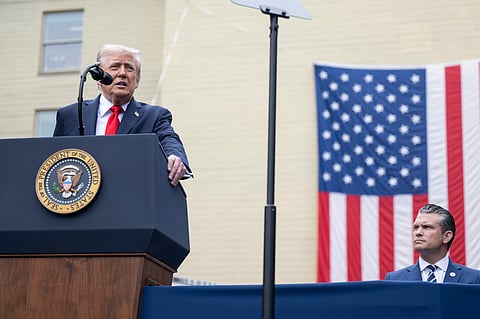

President Donald Trump announced on Friday his intention to deploy National Guard troops to Memphis, Tennessee, to tackle crime issues, marking another instance of federal military involvement in U.S. cities.
This move follows similar actions in Washington, D.C., and Los Angeles, and has sparked mixed reactions from local and state officials.
Trump made the statement during an interview on Fox News, claiming support from both the city's Democratic mayor and the state's Republican governor.
The decision comes after discussions with Union Pacific CEO Jim Vena, who highlighted crime concerns in Memphis based on his prior experiences with the city through FedEx.
Governor Bill Lee confirmed he is coordinating with the Trump administration to outline the roles of the National Guard, alongside agencies like the FBI, Tennessee Highway Patrol, and Memphis Police Department.
Details on the timeline and exact scope remain unclear, with the White House not providing specifics on whether federal law enforcement surges would accompany the troops.
Despite reports of declining crime rates in Memphis, including a 25-year low in overall crime and a six-year low in murders for the first eight months of 2025, Trump described the city as "deeply troubled."
He compared the upcoming intervention to previous deployments, suggesting it would mirror efforts in Washington where troops have been used for patrols and even non-security tasks like cleanup.
Legal experts have raised concerns about the broader implications of using military forces in civilian contexts, especially after a court ruled the Los Angeles deployment unlawful, though that decision does not extend to other locations.
Reactions in Tennessee are divided along partisan lines.
Republican state Senator Brent Taylor supported the deployment, stating it could offer administrative and logistical aid to allow local officers to focus on core duties.
U.S. Senator Marsha Blackburn echoed this approval.
In contrast, Democratic Shelby County Mayor Lee Harris criticized the plan, saying “Mr. President, no one here is ‘happy,’” and expressing opposition to what he called an occupation involving military equipment and personnel.
Memphis Mayor Paul Young, informed earlier in the week of the considerations, emphasized the need for financial resources to support intervention, prevention, and police enhancements rather than troops.
He affirmed commitment to efforts that build on the city's progress.
Governor Lee noted ongoing operations, including an FBI-led initiative that has resulted in hundreds of arrests and increased state trooper presence in the county.
Trump's strategy extends beyond Memphis, with mentions of potential deployments to Democratic-led cities like Chicago, Baltimore, and New Orleans.
He expressed a preference for Chicago but cited resistance from local leaders as a barrier.
In Chicago, Democratic Governor JB Pritzker and Mayor Brandon Johnson have vowed legal challenges to any federal intervention.
Recent federal actions there include immigration enforcement operations detaining individuals with criminal histories, amid accusations of state uncooperation from U.S. Attorney General Pam Bondi.
The Memphis announcement underscores Trump's escalating use of the National Guard under federal authority, such as Title 10 for Los Angeles, bypassing state objections.
In Washington, D.C., troops have been employed extensively without legal hurdles due to direct presidential command.
While crime data nationally shows declines, including in targeted cities, the deployments have tested presidential powers and drawn criticism for militarizing urban areas.
Governor Lee indicated that discussions are ongoing for the next phase of crime strategies, with all options open.
Some Republicans have called for audits of the Memphis Police Department's reporting to ensure accuracy.
As troops prepare to arrive, the focus remains on how this will integrate with existing local efforts and whether it will effectively address underlying issues without exacerbating tensions.